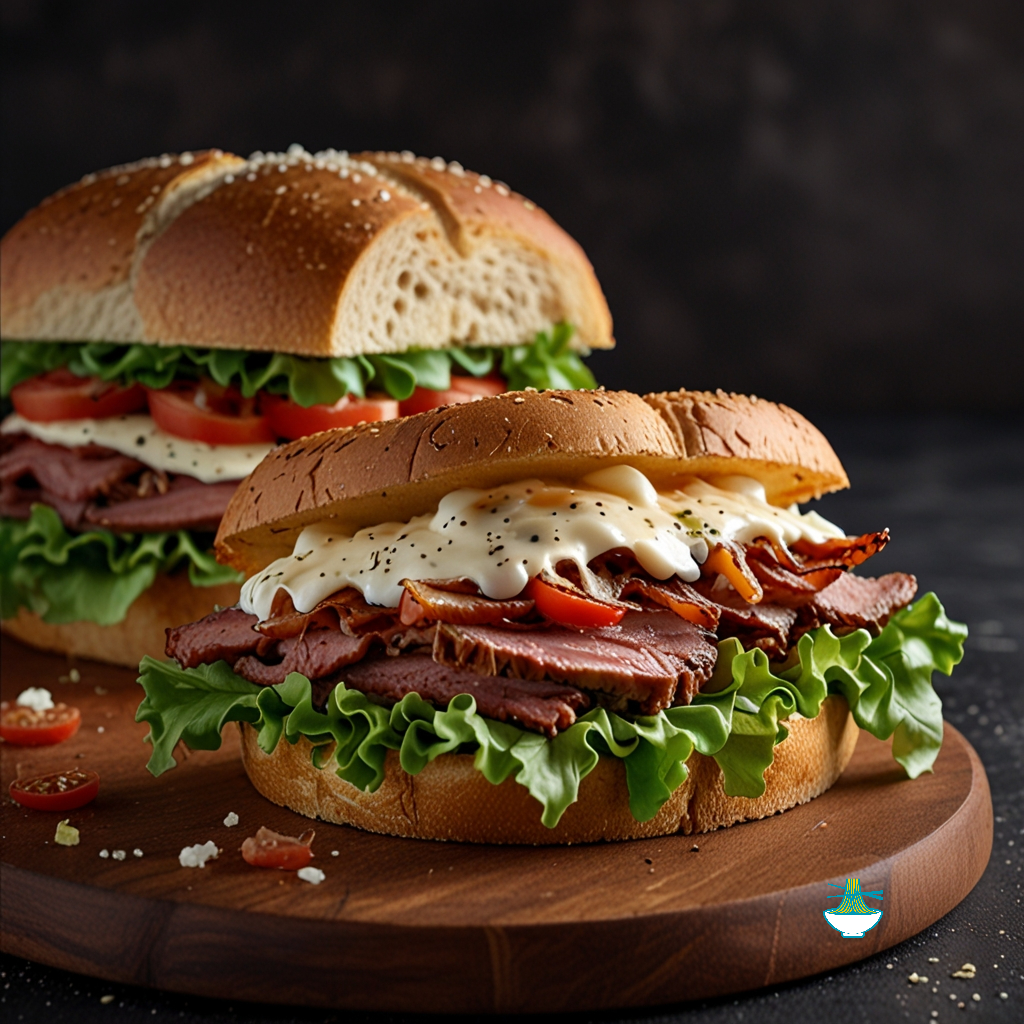The Lomito Completo is a beloved Chilean sandwich renowned for its flavorful combination of thinly sliced beef tenderloin, lettuce, tomato, mayonnaise, cheese, and bacon, all nestled between two slices of bread. Originating in Chile, its history traces back to the influence of European immigration, particularly from Germany and Italy, where the tradition of hearty sandwiches melded with local ingredients. Over time, the Lomito Completo has become a staple of Chilean cuisine, enjoyed in homes, cafes, and street food stalls across the country. Its popularity has even spread beyond Chile's borders, captivating taste buds worldwide with its delicious blend of ingredients and cultural heritage.
Ingredients:
- Thinly sliced beef tenderloin
- Lettuce
- Tomato
- Mayonnaise
- Cheese
- Bacon
- Bread rolls
Method:
1. Cook bacon until crispy and set aside.
2. Season beef tenderloin slices with salt and pepper, then grill or pan-fry until cooked to your preference.
3. Slice the bread rolls in half and lightly toast them if desired.
4. Assemble the sandwiches by spreading mayonnaise on the bottom half of each roll.
5. Layer lettuce, tomato slices, cooked beef tenderloin, crispy bacon, and cheese on top of the mayonnaise.
6. Top with the other half of the roll.
7. Serve immediately and enjoy your delicious Lomito Completo!
Nutrition Value:
1. Thinly sliced beef tenderloin:
- Calories: Approximately 120 calories per 3-ounce serving.
- Carbohydrates: 0 grams.
- Protein: Around 21 grams.
- Fat: Roughly 3 grams.
- Sodium: Varies, typically around 50-70 milligrams.
- Cholesterol: About 60 milligrams.
- Vitamins: Contains B vitamins, particularly B12.
- Minerals: Contains iron, zinc, and selenium.
- Nutritional benefits: High-quality protein source, rich in iron for oxygen transport, and provides essential vitamins and minerals for overall health.
2. Lettuce:
- Calories: Negligible (approximately 5 calories per cup).
- Carbohydrates: Around 1 gram.
- Protein: Less than 1 gram.
- Fat: Less than 1 gram.
- Sodium: Varies, typically less than 10 milligrams.
- Cholesterol: 0 milligrams.
- Vitamins: Excellent source of vitamin A and vitamin K.
- Minerals: Contains small amounts of calcium and potassium.
- Nutritional benefits: Low-calorie, high-fiber vegetable with vitamins and minerals, supports eye health and bone health.
3. Tomato:
- Calories: Low (approximately 22 calories per cup).
- Carbohydrates: Around 5 grams.
- Protein: About 1 gram.
- Fat: Less than 1 gram.
- Sodium: Varies, typically less than 10 milligrams.
- Cholesterol: 0 milligrams.
- Vitamins: Excellent source of vitamin C and vitamin K.
- Minerals: Contains potassium and small amounts of other minerals.
- Nutritional benefits: Low-calorie, high-vitamin fruit with antioxidants, supports immune function and heart health.
4. Mayonnaise:
- Calories: High (approximately 100-110 calories per tablespoon).
- Carbohydrates: Less than 1 gram.
- Protein: 0 grams.
- Fat: Around 11-12 grams, primarily from oil.
- Sodium: Varies, typically around 80-100 milligrams per tablespoon.
- Cholesterol: Varies, but can be around 5-10 milligrams.
- Vitamins: Provides small amounts of vitamin E.
- Minerals: Contains trace amounts of various minerals.
- Nutritional benefits: Provides flavor and moisture, but high in calories and fat, so moderation is key.
5. Cheese:
- Calories: Varies depending on type, generally around 70-120 calories per ounce.
- Carbohydrates: Less than 1 gram.
- Protein: Around 6-7 grams.
- Fat: Varies, typically 5-10 grams, with some types higher.
- Sodium: Varies, but can be significant, especially in processed cheeses.
- Cholesterol: Around 20-30 milligrams.
- Vitamins: Contains vitamin B12 and vitamin A.
- Minerals: Excellent source of calcium and phosphorus.
- Nutritional benefits: Good source of protein and calcium, but high in saturated fat and sodium, so consume in moderation.
6. Bacon:
- Calories: High (approximately 40-50 calories per slice).
- Carbohydrates: 0 grams.
- Protein: Around 3-4 grams.
- Fat: Approximately 3-4 grams, primarily saturated fat.
- Sodium: Varies, but can be high, typically around 200-300 milligrams per slice.
- Cholesterol: Around 10-15 milligrams.
- Vitamins: Contains small amounts of B vitamins, particularly niacin.
- Minerals: Contains trace amounts of minerals.
- Nutritional benefits: Adds flavor and texture, but high in saturated fat and sodium, so consume in moderation.
7. Bread rolls:
- Calories: Varies depending on size and type, generally around 80-150 calories per roll.
- Carbohydrates: Around 15-30 grams.
- Protein: 2-5 grams.
- Fat: Varies, typically 1-3 grams.
- Sodium: Varies, typically around 100-200 milligrams per roll.
- Cholesterol: 0 milligrams.
- Vitamins: Some varieties may contain small amounts of B vitamins and vitamin E.
- Minerals: Contains small amounts of minerals such as iron and magnesium.
- Nutritional benefits: Main source of carbohydrates and energy, but can vary greatly depending on ingredients and preparation method. Choose whole grain varieties for added fiber and nutrients.


Comments